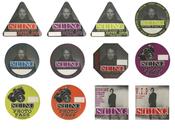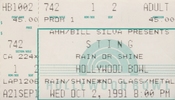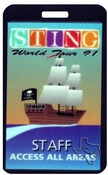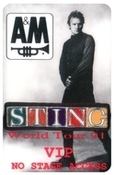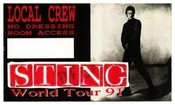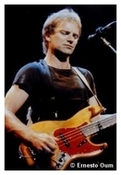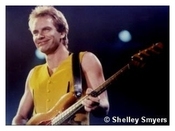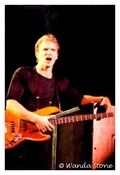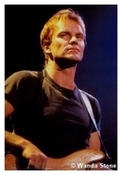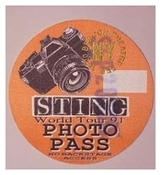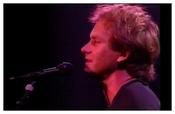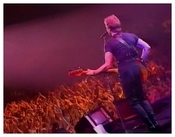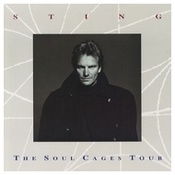
Sting delivers polished concert but abandons high-energy sound...
Rock'n'roll, where is thy Sting?
That's the question inquiring minds must have been asking during Sting's sold-out performance Wednesday at the Hollywood Bowl. The show, the first of a two-night engagement, was refined almost to the point of tedium.
Of course, the show's subdued tenor didn't really come as a surprise. Sting has been polishing his unique rock sound ever since his old band, the Police, split up in the mid-1980s.
But Wednesday's performance was more drab than fab. It was all the more disappointing because the concert doubled as Sting's 40th birthday bash. The event was shown live nationally on pay-per-view television. Adding to the excitement were rumors that a host of big stars would be on hand to help Sting celebrate.
The most scintillating rumor, however, was that the Police would reunite. Former Police guitarist Andy Summers did show up toward the end of the performance, but drummer Stewart Copeland was conspicuously absent.
As it turns out, Summers' presence was all too appropriate since it was old Police songs and a cover of Jimi Hendrix's 'Purple Haze' that received the most enthusiastic response.
But fans had to wade through thickets of Sting's mysterious jazz-pop before getting to the meatier, more energetic fare. Sting and his fine three- piece band began the show with a series of laid-back tunes from the singer's current A&M Records album, 'The Soul Cages'.
Things didn't really get moving until midway through the show, when the band performed an odd version of the Police favorite, 'Roxanne'. But that performance - like nearly every tune the singer performed - featured an incongruous jazz passage that diminished the song's rock 'n' roll impact.
The highlight of the show was something many people probably didn't pick up on. As he demonstrated last winter during a spate of performances at the Wiltern Theatre, Sting's bass playing has improved tremendously since his Police days. His technique was once stiff and rudimentary, but it's now funky and fluid.
In fact, the entire show was a treat for musicians. Sting has assembled a crack jazz-rock ensemble capable of conveying a wealth of moods and emotions.
Unfortunately, the one emotion the band seemed incapable of communicating is joy. Even rave-ups like 'Roxanne', 'Driven to Tears' and 'We'll Be Together' were plagued by aloofness. It was almost as if Sting was afraid to rock out for fear of staining his virtuosic reputation.
This seemed most evident during the sole encore of the evening, an interpretation of the elegant ballad 'Fragile'. The message behind the song - that we should never lose sight of the delicacy of life - was well taken. Yet despite its good intentions, the performance was as anti-climactic as anyone could ever imagine.
Sting's concerns about his credibility are understandable, but that shouldn't mean he has to abandon the high-energy sound that made him a superstar in the first place. Wednesday's performance made Sting's new 'Soul Cages' album seem all too appropriately titled. The show felt and looked like the work of a constrained muse.
(c) The Daily News of Los Angeles by Bruce Bitt
Heart and soul from Sting...
Contrary to some radio news accounts, Sting's concert Wednesday night was not cut short because of the demonstration against Gov. Wilson's veto of gay rights legislation in front of the Hollywood Bowl.
The concert just may have seemed abbreviated - at least to anyone who saw Sting's splendid performances at the start of his yearlong 'The Soul Cages' tour in February at the Wiltern Theatre.
Instead of using the spectacular Bowl setting and a national pay-per-view cable telecast to expand that two-hour Wiltern program, the English singer-songwriter, who was celebrating his 40th birthday, chopped 20 minutes from the Wiltern presentation. And it was a crucial 20 minutes because much of it came from one of the most absorbing elements of the Wiltern concert: a four-song cycle from Sting's recent 'The Soul Cages' album, a sombre, ambitious work that grew out of reflections on the death of his father in 1987.
While other, more accessible songs from 'Cages', including the wistful, philosophical 'All This Time', also deal eloquently with the feelings of loss outlined in the album, the cycle touches on the theme in a more abstract, literary way that defines of boldness of Sting's artistry and scope. The songs, including 'Island of Souls', 'Wild Wild Sea', and 'When the Angels Fall', didn't add up to easy listening at the Wiltern, and you could sense some fans getting restless during the demanding journey.
Yet it was also a wholly compelling musical experience, and Sting's decision to follow the emotionally draining sequence with a liberating version of Jimi Hendrix's 'Purple Haze' was brilliant. By eliminating two of the four songs Wednesday, however, Sting both sacrificed the power of the work and reduced the liberating quality of 'Purple Haze' so much that the latter was simply a vigorous change of theatrical pace.
The fans at the Bowl, however, shouldn't feel discriminated against. Sting stopped using the four-song cycle shortly after the Wiltern performance, when his tour moved from intimate theatre's into arenas. He apparently felt that the cycle might be too difficult for audiences to absorb in the larger setting.
Still, he would have been well advised in returning to Southern California to restore it for the Bowl show, because it was a special night, and you'd like to see an artist of his quality at his most challenging, especially when the performance is being documented in a pay-per-view.
If the Bowl show didn't equal the drama of the Wiltern date, however, it continued to show that Sting is at the forefront of the valuable new wave of veteran artists, including Paul Simon, Joni Mitchell, Peter Gabriel and Don Henley, who are giving pop a new sophisticated or adult dimension.
Looking dashing a bright yellow vest and black trousers, Sting reached back to his Police days for a half-dozen songs, including 'Roxanne' and 'Every Breath You Take'. Sting concentrated on material from his solo albums - songs that explore and interrelate social and personal themes about values and obligations.
Despite all these months on the road, Sting and his three-piece band - David Sancious on keyboards, Dominic Miller on guitar and Vinnie Colaiuta - continue to play the material with the investigatory passion of musicians who enjoy looking for new ripples of emotion and subtlety in the tunes. Sting, whose tour will continue tonight at the Pacific Amphitheatre in Costa Mesa, was joined for the closing numbers by his old Police sidekick Andy Summers, along with some other music friends, including members of Special Beat, giving the evening a warm, joyful edge.
Watching Sting, on bass, and Summers, on guitar, side by side again reminded you of how daring a move it was in 1983 for Sting to leave one of the most successful rock groups ever formed to pursue the artistic freedom offered by a solo career. Yet the excellence of the music itself Wednesday - even with the absence of the 'Cages' cycle - made it clear that the move was absolutely correct.
(c) The Los Angeles Times by Robert Hilburn
Stars come out to help an emotional Sting celebrate birthday...
The few stars visible in the pitch-black sky above the Hollywood Bowl Wednesday night were easily eclipsed by the stellar array of musical guests present for Sting's 40th birthday concert.
Those in attendance for the show, which was co-promoted by San Diego's Bill Silva Presents and telecast live across the country as a pay-per-view special, included Joni Mitchell, Herbie Hancock, Don Henley and Jackson Browne, along with actress Darryl Hannah, film director Barry Levinson, soap opera hunkster Michael Damian and enough major and minor TV stars to cast several miniseries.
To the possible disappointment of some of the 17,839 fans who packed the Bowl to capacity, most of Sting's illustrious musical pals didn't join him on stage during the concert, although all were on hand for the private, after-show party hosted by the English superstar's record company at a nearby sound stage.
Only former Police guitarist Andy Summers, singer-songwriter Vinx (who opened the evening with a five-minute micro-set) and three members of English ska band Special Beat accompanied Sting and his three-man band in the finale of the 105-minute show.
But neither the absence of major cameo performances (Henley and Bruce Springsteen had been expected to sing with Sting) nor Sting's increasingly strained voice detracted from what proved to be an impassioned evening of sophisticated pop-rock. The former frontman for the Police and his gifted bandmates frequently achieved a level of improvisational interplay worthy of a first-class jazz group. Particularly impressive was keyboardist David Sancious, whose solos were a perfect blend of visceral power and harmonic ingenuity.
Sting, who took to the stage at 8:22 p.m. after a technical delay, was dressed in dark jeans, black knee-high boots and a yellow vest worn sans shirt. He was greeted with a massive roar from the crowd, which was clearly ready for a hot night of music after a sweltering 99-degree day that tied the local heat record. After opening with a punchy version of 'All This Time' and 'Jeremiah Blues (Part I)' from his album 'The Soul Cages', Sting took a sip from a cup of tea - his first acknowledgement that his voice was strained. But his failing voice only compelled him to perform with greater vigor and intensity.
His singing ranked among his most emotional in memory. The songs he performed from 'The Soul Cages', his emotionally gripping portrait of growing up in working-class England, seemed especially meaningful to Sting on his birthday. But not all of the concert was so dramatic.
'Roxanne', 'We'll be Together Again' and a searing cover of Jimi Hendrix's 'Purple Haze' were less lofty in intent but no less powerful in impact.
The only thing that did dilute the concert's impact was the series of trite illustrations projected on large screens to either side of the stage. Before performing the inspirational ballad 'Fragile' for his encore, Sting thanked the crowd, saying: ''It's been a hell of a birthday. Next time, I'll be more discreet.''
One can only hope he was jesting, because on Wednesday, discretion was clearly not the better part of valour.
(c) The San Diego Union-Tribune by George Varga
Sting celebrated his 40th birthday with 17,900 friends...
Sting celebrated his 40th birthday with 17,900 friends in a jazzy, unpretentious concert that featured a partial Police reunion.
Sting has pretty much put away the rock-new wave toys of his youth and concentrated on creating ''adult'' music that combines jazz and soft rock. And while the first half of the show stressed the lyrical, fusion-oriented tunes like those found on 'The Soul Cages' and 'Nothing Like the Sun' albums, it was clear the audience was hyped up for the harder-edged older songs that brought the chardonnay-sipping, pate-munching baby boomers to their feet.
Opening with 'All This Time' from the 'Soul Cages' album, Sting explored the musical landscape between fusion and pop, even to the point of creating jazz-oriented re-orchestrations of covers such as 'Ain't No Sunshine' and the Police classic 'Roxanne'.
The latter tune, however, lost ground without its funky, R&B edge. It should be noted that jazz was his first love, and Sting (nee Gordon Sumner) became a rocker after teaming up with drummer Stewart Copeland in the early '70s.
While the pop jazz jams were politely well-received, especially on tunes that featured keyboardist David Sancious, the crowd saved their real enthusiasm for the latter part of the show. The band put the audience on notice that they weren't just jazz wimps with a well-crafted rendition of Jimi Hendrix's 'Purple Haze'.
The fans did not seem to want Police songs per se; they just seemed to prefer Sting's tougher stances, such as those found on the funk and rock numbers, and especially on his patented ''blue-eyed reggae'' tunes like 'Message in a Bottle' and 'Walking on the Moon'.
Other highlights included 'Driven to Tears', a gospel-like 'Set Them Free' and 'Mad About You', a love song in the vein of 'Every Breath You Take' that set the women swooning.
Oddly, the quartet did not play 'When Angels Fall', perhaps the best song on 'Cages'.
Without fanfare, or even an introduction, Police guitarist Andy Summers reunited with his old mate for a rendition of the ska tune 'Walking on the Moon'. As a wave of recognition slowly swept the audience, and the band segued to 'Every Breath You Take', it became obvious that Summers is an outstanding rock guitarist whose current jazz career are that genre's gain and rock's loss.
The show ended with an extended dance mix version of 'Message in a Bottle', though fans brought Sting back with a robust 17,900-strong rendition of ''Happy Birthday.''
Fireworks and a fireworks' cake with ''Happy Birthday'' and ''40'' written on it capped the evening.
(c) The Hollywood Reporter by Jeffrey Jolson-Colburn
Rock'n'roll, where is thy Sting?
That's the question inquiring minds must have been asking during Sting's sold-out performance Wednesday at the Hollywood Bowl. The show, the first of a two-night engagement, was refined almost to the point of tedium.
Of course, the show's subdued tenor didn't really come as a surprise. Sting has been polishing his unique rock sound ever since his old band, the Police, split up in the mid-1980s.
But Wednesday's performance was more drab than fab. It was all the more disappointing because the concert doubled as Sting's 40th birthday bash. The event was shown live nationally on pay-per-view television. Adding to the excitement were rumors that a host of big stars would be on hand to help Sting celebrate.
The most scintillating rumor, however, was that the Police would reunite. Former Police guitarist Andy Summers did show up toward the end of the performance, but drummer Stewart Copeland was conspicuously absent.
As it turns out, Summers' presence was all too appropriate since it was old Police songs and a cover of Jimi Hendrix's 'Purple Haze' that received the most enthusiastic response.
But fans had to wade through thickets of Sting's mysterious jazz-pop before getting to the meatier, more energetic fare. Sting and his fine three- piece band began the show with a series of laid-back tunes from the singer's current A&M Records album, 'The Soul Cages'.
Things didn't really get moving until midway through the show, when the band performed an odd version of the Police favorite, 'Roxanne'. But that performance - like nearly every tune the singer performed - featured an incongruous jazz passage that diminished the song's rock 'n' roll impact.
The highlight of the show was something many people probably didn't pick up on. As he demonstrated last winter during a spate of performances at the Wiltern Theatre, Sting's bass playing has improved tremendously since his Police days. His technique was once stiff and rudimentary, but it's now funky and fluid.
In fact, the entire show was a treat for musicians. Sting has assembled a crack jazz-rock ensemble capable of conveying a wealth of moods and emotions.
Unfortunately, the one emotion the band seemed incapable of communicating is joy. Even rave-ups like 'Roxanne', 'Driven to Tears' and 'We'll Be Together' were plagued by aloofness. It was almost as if Sting was afraid to rock out for fear of staining his virtuosic reputation.
This seemed most evident during the sole encore of the evening, an interpretation of the elegant ballad 'Fragile'. The message behind the song - that we should never lose sight of the delicacy of life - was well taken. Yet despite its good intentions, the performance was as anti-climactic as anyone could ever imagine.
Sting's concerns about his credibility are understandable, but that shouldn't mean he has to abandon the high-energy sound that made him a superstar in the first place. Wednesday's performance made Sting's new 'Soul Cages' album seem all too appropriately titled. The show felt and looked like the work of a constrained muse.
(c) The Daily News of Los Angeles by Bruce Bitt
Heart and soul from Sting...
Contrary to some radio news accounts, Sting's concert Wednesday night was not cut short because of the demonstration against Gov. Wilson's veto of gay rights legislation in front of the Hollywood Bowl.
The concert just may have seemed abbreviated - at least to anyone who saw Sting's splendid performances at the start of his yearlong 'The Soul Cages' tour in February at the Wiltern Theatre.
Instead of using the spectacular Bowl setting and a national pay-per-view cable telecast to expand that two-hour Wiltern program, the English singer-songwriter, who was celebrating his 40th birthday, chopped 20 minutes from the Wiltern presentation. And it was a crucial 20 minutes because much of it came from one of the most absorbing elements of the Wiltern concert: a four-song cycle from Sting's recent 'The Soul Cages' album, a sombre, ambitious work that grew out of reflections on the death of his father in 1987.
While other, more accessible songs from 'Cages', including the wistful, philosophical 'All This Time', also deal eloquently with the feelings of loss outlined in the album, the cycle touches on the theme in a more abstract, literary way that defines of boldness of Sting's artistry and scope. The songs, including 'Island of Souls', 'Wild Wild Sea', and 'When the Angels Fall', didn't add up to easy listening at the Wiltern, and you could sense some fans getting restless during the demanding journey.
Yet it was also a wholly compelling musical experience, and Sting's decision to follow the emotionally draining sequence with a liberating version of Jimi Hendrix's 'Purple Haze' was brilliant. By eliminating two of the four songs Wednesday, however, Sting both sacrificed the power of the work and reduced the liberating quality of 'Purple Haze' so much that the latter was simply a vigorous change of theatrical pace.
The fans at the Bowl, however, shouldn't feel discriminated against. Sting stopped using the four-song cycle shortly after the Wiltern performance, when his tour moved from intimate theatre's into arenas. He apparently felt that the cycle might be too difficult for audiences to absorb in the larger setting.
Still, he would have been well advised in returning to Southern California to restore it for the Bowl show, because it was a special night, and you'd like to see an artist of his quality at his most challenging, especially when the performance is being documented in a pay-per-view.
If the Bowl show didn't equal the drama of the Wiltern date, however, it continued to show that Sting is at the forefront of the valuable new wave of veteran artists, including Paul Simon, Joni Mitchell, Peter Gabriel and Don Henley, who are giving pop a new sophisticated or adult dimension.
Looking dashing a bright yellow vest and black trousers, Sting reached back to his Police days for a half-dozen songs, including 'Roxanne' and 'Every Breath You Take'. Sting concentrated on material from his solo albums - songs that explore and interrelate social and personal themes about values and obligations.
Despite all these months on the road, Sting and his three-piece band - David Sancious on keyboards, Dominic Miller on guitar and Vinnie Colaiuta - continue to play the material with the investigatory passion of musicians who enjoy looking for new ripples of emotion and subtlety in the tunes. Sting, whose tour will continue tonight at the Pacific Amphitheatre in Costa Mesa, was joined for the closing numbers by his old Police sidekick Andy Summers, along with some other music friends, including members of Special Beat, giving the evening a warm, joyful edge.
Watching Sting, on bass, and Summers, on guitar, side by side again reminded you of how daring a move it was in 1983 for Sting to leave one of the most successful rock groups ever formed to pursue the artistic freedom offered by a solo career. Yet the excellence of the music itself Wednesday - even with the absence of the 'Cages' cycle - made it clear that the move was absolutely correct.
(c) The Los Angeles Times by Robert Hilburn
Stars come out to help an emotional Sting celebrate birthday...
The few stars visible in the pitch-black sky above the Hollywood Bowl Wednesday night were easily eclipsed by the stellar array of musical guests present for Sting's 40th birthday concert.
Those in attendance for the show, which was co-promoted by San Diego's Bill Silva Presents and telecast live across the country as a pay-per-view special, included Joni Mitchell, Herbie Hancock, Don Henley and Jackson Browne, along with actress Darryl Hannah, film director Barry Levinson, soap opera hunkster Michael Damian and enough major and minor TV stars to cast several miniseries.
To the possible disappointment of some of the 17,839 fans who packed the Bowl to capacity, most of Sting's illustrious musical pals didn't join him on stage during the concert, although all were on hand for the private, after-show party hosted by the English superstar's record company at a nearby sound stage.
Only former Police guitarist Andy Summers, singer-songwriter Vinx (who opened the evening with a five-minute micro-set) and three members of English ska band Special Beat accompanied Sting and his three-man band in the finale of the 105-minute show.
But neither the absence of major cameo performances (Henley and Bruce Springsteen had been expected to sing with Sting) nor Sting's increasingly strained voice detracted from what proved to be an impassioned evening of sophisticated pop-rock. The former frontman for the Police and his gifted bandmates frequently achieved a level of improvisational interplay worthy of a first-class jazz group. Particularly impressive was keyboardist David Sancious, whose solos were a perfect blend of visceral power and harmonic ingenuity.
Sting, who took to the stage at 8:22 p.m. after a technical delay, was dressed in dark jeans, black knee-high boots and a yellow vest worn sans shirt. He was greeted with a massive roar from the crowd, which was clearly ready for a hot night of music after a sweltering 99-degree day that tied the local heat record. After opening with a punchy version of 'All This Time' and 'Jeremiah Blues (Part I)' from his album 'The Soul Cages', Sting took a sip from a cup of tea - his first acknowledgement that his voice was strained. But his failing voice only compelled him to perform with greater vigor and intensity.
His singing ranked among his most emotional in memory. The songs he performed from 'The Soul Cages', his emotionally gripping portrait of growing up in working-class England, seemed especially meaningful to Sting on his birthday. But not all of the concert was so dramatic.
'Roxanne', 'We'll be Together Again' and a searing cover of Jimi Hendrix's 'Purple Haze' were less lofty in intent but no less powerful in impact.
The only thing that did dilute the concert's impact was the series of trite illustrations projected on large screens to either side of the stage. Before performing the inspirational ballad 'Fragile' for his encore, Sting thanked the crowd, saying: ''It's been a hell of a birthday. Next time, I'll be more discreet.''
One can only hope he was jesting, because on Wednesday, discretion was clearly not the better part of valour.
(c) The San Diego Union-Tribune by George Varga
Sting celebrated his 40th birthday with 17,900 friends...
Sting celebrated his 40th birthday with 17,900 friends in a jazzy, unpretentious concert that featured a partial Police reunion.
Sting has pretty much put away the rock-new wave toys of his youth and concentrated on creating ''adult'' music that combines jazz and soft rock. And while the first half of the show stressed the lyrical, fusion-oriented tunes like those found on 'The Soul Cages' and 'Nothing Like the Sun' albums, it was clear the audience was hyped up for the harder-edged older songs that brought the chardonnay-sipping, pate-munching baby boomers to their feet.
Opening with 'All This Time' from the 'Soul Cages' album, Sting explored the musical landscape between fusion and pop, even to the point of creating jazz-oriented re-orchestrations of covers such as 'Ain't No Sunshine' and the Police classic 'Roxanne'.
The latter tune, however, lost ground without its funky, R&B edge. It should be noted that jazz was his first love, and Sting (nee Gordon Sumner) became a rocker after teaming up with drummer Stewart Copeland in the early '70s.
While the pop jazz jams were politely well-received, especially on tunes that featured keyboardist David Sancious, the crowd saved their real enthusiasm for the latter part of the show. The band put the audience on notice that they weren't just jazz wimps with a well-crafted rendition of Jimi Hendrix's 'Purple Haze'.
The fans did not seem to want Police songs per se; they just seemed to prefer Sting's tougher stances, such as those found on the funk and rock numbers, and especially on his patented ''blue-eyed reggae'' tunes like 'Message in a Bottle' and 'Walking on the Moon'.
Other highlights included 'Driven to Tears', a gospel-like 'Set Them Free' and 'Mad About You', a love song in the vein of 'Every Breath You Take' that set the women swooning.
Oddly, the quartet did not play 'When Angels Fall', perhaps the best song on 'Cages'.
Without fanfare, or even an introduction, Police guitarist Andy Summers reunited with his old mate for a rendition of the ska tune 'Walking on the Moon'. As a wave of recognition slowly swept the audience, and the band segued to 'Every Breath You Take', it became obvious that Summers is an outstanding rock guitarist whose current jazz career are that genre's gain and rock's loss.
The show ended with an extended dance mix version of 'Message in a Bottle', though fans brought Sting back with a robust 17,900-strong rendition of ''Happy Birthday.''
Fireworks and a fireworks' cake with ''Happy Birthday'' and ''40'' written on it capped the evening.
(c) The Hollywood Reporter by Jeffrey Jolson-Colburn

